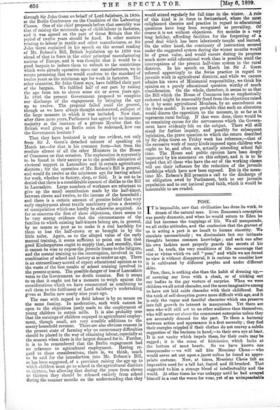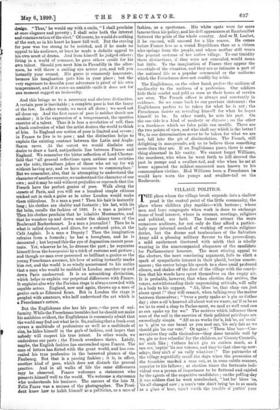POSE.
TT is impossible, now that civilisation has done its work, to dream of the natural man. Even Rousseau's conception was purely dramatic, and when he would return to Eden he did but increase the trappings of life. We all masquerade, we all strike attitudes, and the confession that the gravest of us is acting a part is no insult to human sincerity. We simulate unconsciously ; we dissimulate lest our intimate thoughts become common knowledge ; and each one after his own fashion most properly guards the secrets of his soul. In truth, the very conditions of life encourage that vice or virtue which we call "pose," and while we are lofted to view it without disapproval, it is curious to consider how it is cultivated by different peoples and under different skies.
Pose, then, is nothing else than the habit of dressing up,— of covering our lives with a cloak, or of tricking out our bodies in the gay vesture of surprise. When we were children we all acted charades, and the more imaginative among us have not laid aside charades with their childhood. But the trick of self-deception grows more difficult with age, and it is only the vague and fanciful character which can preserve into full growth its interest in masquerade. Yet there are men who will still act to no other audience than themselves, who will never set about the commonest enterprise unless they are accurately dressed for the part. To them a harmony between action and appearance is a first necessity ; they find their energies crippled if their clothes do not convey a subtle suggestion of the business in hand,—to their own eye at least.. It is not vanity which impels them, for their coats may be !lined ; it is the sense of histrionics, which lurks at the bottom of most hearts. So we have known One masquerader — we will call him Monsieur Chose— who would never set out upon a jaunt unless he found an appro- priate costume. Now, at times, Monsieur Choie felt an imperative need for a tall hat, frayed and ill-brushed. That suggested to him a strange blend of intellectuality and the world. At other times he was unhappy until he had arrayed himself in a coat the worse for wear, yet of an unimpeachable design.." Thus," he would say with a smile, "I shall proclaim at once elegance and poverty ; I shall seize both the interest and commiseration of the elect." Of course, he would do nothing of the sort, as in his heart he knew full well. But the craving for pose was too strong to be resisted, and if he made no appeal to his audience, at least he made a definite appeal to his own sensb of drama. And from himself he judged others : living in a world of romance, he gave others credit for his own talent. Should you meet him in Piccadilly in the after- noon, he will throw a smiling eye across you, and tell you instantly your errand. His guess i6 commonly inaccurate, because his imagination puts him in your place ; but the very eagerness to describe your adventure is proof of his own temperament, and if it rouse an amiable smile it does not for one moment suggest an insincerity.
And this brings us to a necessary and obvious distinction. A certain pose is inevitable ; a complete pose is but the fancy of the few. In other words, we must all dress ; we need not all dress up. And the first cause of pose is neither deceit nor candour ; it is the expression of a temperament, the sportive exercise of a talent. Thus it is less a revelation of self, than a frank confession of what the artist desires, the world to think of-him. In England our notion of pose is limited and severe ; in France to live is to pose ; and the distinction helps to explain the existing contrast between the Latin and Anglo- Saxon races. At the outset we would disclaim any desire to draw a hard, antipathetic line between France and England. We remember the bitter reflection of Lord Chester- field that "all general reflections upon nations and societies are the trite,threadbare jokes of those who set up for wit without having any, and so have recourse to commonplace." But we remember, also, that in 'attempting to understand the character of another country, we understand the character of our own ; and it may be said without prejudice or reproach that the French have the perfect genius of pose. Walk along the streets of Paris, and you will see a hundred simple citizens tricked out in such a guise as in sober London would make them ridiculous. Is a man a poet ? Then his hair is instantly long ; his clothes are shabby and fantastic ; his hat, with its flat brim, reealls the fashion of 1830. Is a man a painter ? lien his clothes proclaim that he inhabits Montmartre, and that he wanders up and down under the skinny trees of the Boulevard Rochechouart. Is a man a journalist 1. Then he is what is called Ipat ant, and dines, for a reduced price, at the Cafe Anglais. Is a man a Deputy ? Then the imagination refrains from a formula ; he has a brougham, and he is decorated ; but beyond this the eye of dogmatism cannot pene- trate. Yet, whoever he be, he dresses the part ; he separates himself from the bourgeoisie by a trick of costume and gesture ; and though no man ever possessed so brilliant a genius as the young Frenchman assumes, his love of acting instantly marks him out, and the world is so wisely accustomed to his antics that a man who would be mobbed in London marches up and down Paris unobserved. It is an astonishing distinction, which helps to explain our perpetual differences with France. It explains also why the Parisian stage is always crowded with capable actors. England, now and again, throws up a man of genius such as Edmund Kean. But in London the stage is peopled with amateurs, who half understand the art which is a Frenchman's nature.
But the Englishman also has his pose,—the pose of uni- formity. While the Frenchman trembles lest he should not make his ambition evident, the Englishman is commonly afraid that the world may find out what he is. So, realising that a frock-coat covers a multitude of professions as well as a multitude of sins, he hides himself in the garb of fashion, and hopes that nobody will suspect his true intent. In other words, we underdress our parts ; the French overdress theirs. Lately, maybe, the English fashion has encroached upon France. The man of letters has flirted with the great world, and has con- cealed his true profession in the borrowed plumes of the Faubourg. But that is a passing fashion ; it is, in effect, another kind of pose, which does not disturb the general practice. And in all walks of life the same differences may be observed. France welcomes a statesman who presents himself well to the world. We welcome a statesman who understands his business. The success of the late M. Felix Inure was a success of the photographer. The Presi- dent knew how to habit himself as a politician, as a man of fashion, as a sportsman. His white spats were far more famous than his policy, and his deft appearance at Rambouillet flattered the pride of the whole country. And so M. Loubet, if he succeed, will succeed for a like reason.. He comes before France less as a sound Republican than as a citizen who springs from the people, and whose mother still wears the peasant costume of her native village. To our timidity these distinctions, if they were not concealed, would mean but little. To the imagination of France they appear the essentials of the situation, and they are as intimate a part of the national life as a popular ceremonial or the uniforms which the Frenchman does not readily lay aside.
The Englishman, on the other hand, prefers the uniform of mediocrity to the uniform of a profession. Our soldiers hide their scarlet and gold as soon as their hours of service are over. The French officer is always and constantly in evidence. So we come back to our previous statement : the Englishman prefers to be taken for what he is not ; the Frenchman insists on revealing himself for what he hopes himself to be. In other words, he acts his part. On the one side is a kind of modesty or shyness ; on the other is a frankness which no false pride can modify. These are the two points of view, and who shall say which is the better ? We, in our determination never to he taken for what we are not, fall into the pit of dissimulation. The French, still delighting in masquerade, ask us to believe them something more than they are. If an Englishman poses, there is some- thing abnormal in his vanity. We cannot forget Williams, the murderer, who when he went forth to kill dressed the part in pumps and a swallow-tail, and who when he seta home appeared the -mildest-mannered man known to his commonplace victims. Had Williams been a Frenchman he would have worn the pumps and swallow-tail on the Boulevards.







































 Previous page
Previous page